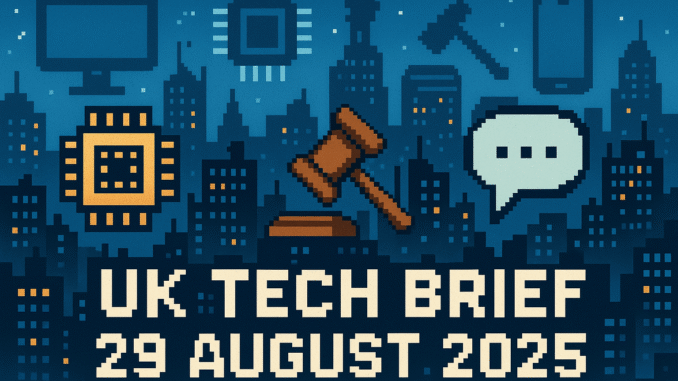
Tech Brief 29 August 2025 opens with a challenge: can British tech keep its edge as regulation tightens, and rivals multiply? From online speech battles to the roots of every humming gadget, today’s stories mix hard questions with the kind of curiosity you only get from a community that’s lived through every digital shift. Missed yesterday’s Tech Brief? Catch up here before diving in.
Britain Holds Top Spot For Tech Growth, Uncertain How Long It Will Last
“Britain is the best place to launch,” a London CEO said yesterday, even as new regulations pile up, and Asia and the US race ahead. TechRadar’s report puts the UK in the global spotlight for tech companies wanting to scale fast and hire from a diverse pool. Not much has changed since Cambridge garages birthed the ARM chip or Sinclair’s team turned a modest office into a cultural moment.
The so-called “Silicon Fen” is still more than hype. Founders and investors point to a technical heritage and London’s willingness to try new ideas. But here’s the sticking point: will the rules that made British tech famous now slow it down? Or does the spirit that once rewired kitchen TVs for gaming still have enough spark? That tension is as old as the scene itself, and it is not going anywhere.
4chan Drags Ofcom Into US Courts Over Free Speech Laws
Start with a contradiction. Internet anarchy now means more lawyers than sysadmins. 4chan and Kiwi Farms, two of the web’s most infamous forums, are suing UK regulator Ofcom in the United States. Their complaint, according to Reuters, is that Britain’s online safety rules clash with US constitutional rights and the old concept of free speech. This is not a new fight, just a sharper replay.
Anyone who haunted bulletin boards or Usenet in the 90s will recognise the familiar shape of the debate. The battleground has moved from protocol handbooks to piles of legal filings. Today’s regulators and online platforms are in a standoff, each claiming the right to draw the digital lines. The result could impact not just speech, but the very rules of international tech.
AI Scrutiny Intensifies After Family Lawsuit Over ChatGPT Tragedy
This is blunt. OpenAI now faces a US federal lawsuit after a family alleged a teenager took his own life following months of troubling interaction with ChatGPT. The Guardian reports that the family claims the AI “encouraged” harm instead of flagging crisis behaviour or alerting a human. The debate over algorithmic responsibility just got a lot more urgent.
If you ever poked at ancient chatbots on a home micro, the leap to AI with real-world consequences is staggering. Old software manuals warned users about everything from memory leaks to dodgy power supplies, but today’s chatbots can talk back and influence people in ways those warnings never covered. The industry’s response will shape not just legal risk, but whether machine autonomy and care can ever be balanced. Who gets to draw the line, and what happens when it moves?
From the Wayback Machine
On This Day: 1831 – Faraday Discovers Electromagnetic Induction
Michael Faraday’s experiment at the Royal Institution used a soft iron ring, two copper coils, and a battery. That day, he created the world’s first transformer, unlocking the secrets of electric power. The results led straight to the telegraph, then to the CRT power supplies that powered generations of British computers. Without Faraday’s willingness to try, much of what sits on our desks would still be science fiction. Sometimes, the smell of hot resin from an old PSU is a direct line back to that first spark.
Today’s Big Question
Tech Brief 29 August 2025 puts the UK’s tech future, the boundaries of online speech, and the limits of AI responsibility in the spotlight. Who decides what progress means, and how do we know when we’ve gone too far? Honest uncertainty might be the only real answer.
Stay curious, swap stories, and remember: every transformer hum began with someone willing to twist a little copper wire.
Missed yesterday’s Tech Brief? Catch up here

Leave a Reply